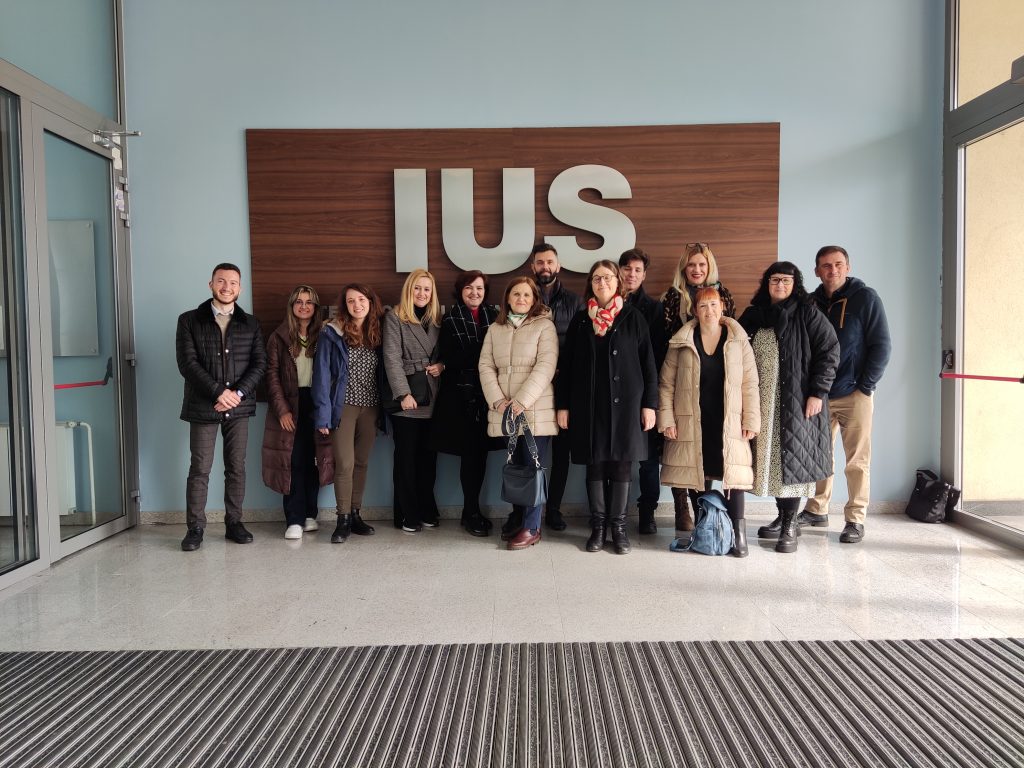Second Transnational Meeting in Sarajevo, 20-21 February 2024

Developing Capacity for VET System in Western Balkans: A Glimpse into the 2nd Transnational Meeting in Sarajevo
The 2nd Transnational Meeting for the DC-VET WB project was held in Sarajevo on the 20th and 21st of February, 2024, marking a significant stride towards enhancing vocational training in the region. Hosted by the International University of Sarajevo (IUS) and IUS Lifelong Learning Center, the meeting brought together a diverse group of stakeholders from partner countries in this project, Uniser – Italy, IES Pedro de Tolosa – Spain, Ammattiopisto Luovi – Finland, AlbanianSkills – Albania, Chamber of Economy of Montenegro – Montenegro and Prishtina REA – Kosovo, to discuss the project’s progress, challenges, and future steps.
The meeting kicked off on the 20th of February with a warm welcome and presentation of the agenda, followed by a tour of the IUS campus, providing participants with a firsthand look at the university’s facilities. This initial interaction set a collaborative tone, fostering an environment conducive to open discussion and exchange between participants.
The very first session delved into the current state of the project, with updates on activities, administrative checks, and budget considerations. A quality assessment of Work Package 1 (WP1) highlighted the ongoing efforts to maintain high standards throughout the project’s execution.
The discussions were not just reflective but also forward-looking, with workshops aimed at finalizing WP2, including its pilot activities, as part of the teachers’ study visits during September 2023. Also during these sessions, brainstorming activities for 2024, particularly focusing on the creation of networks of local stakeholders.
The latter part of the day was dedicated to discussions on dissemination strategies and networking with local stakeholders. Participants emphasized the importance of effectively communicating the value and impact of the DC-VET WB project to a wider audience. The session facilitated the exchange of innovative dissemination tactics, through better visibility on social media, increasing the online and offline promotion of the project and sharing some insights into the project’s social media accounts, to better understand the importance of the dissemination. This session included also a workshop on how to help foster partnerships with key local stakeholders, ensuring the sustainability and growth of VET initiatives at the local and national levels.
The following day, the focus shifted towards more specific aspects of the project. The administration and logistical organization of an upcoming seminar on social inclusion in Finland were thoroughly discussed, part of Work Package 3 (WP3), emphasizing the importance of inclusion in VET systems. A significant portion of this session time was dedicated to discussing and validating a questionnaire on skills gap analysis concerning inclusion, highlighting the project’s commitment to addressing the nuanced needs of diverse people.
The selection of participants for pilot activities was another critical topic, underlining the project’s dedication to inclusivity and effective implementation. The discussions provided valuable insights into planning, monitoring, and supervising participants, ensuring the project’s impact is both significant and sustainable.
The meeting concluded with a visit to “Srednjoškolski Centar Hadžići” VET school, offering participants a practical perspective on the VET landscape in Sarajevo. This visit underscored the project’s real-world implications and the tangible changes it aims to bring about in vocational education and training.
The 2nd Transnational Meeting in Sarajevo was more than just an update on the DC-VET WB project. It was a testament to the collaborative spirit and shared vision of all stakeholders involved. The discussions and workshops not only reflected on past achievements but also paved the way for future initiatives, ensuring the project’s objectives were met with innovation, inclusivity, and efficiency.
As the project moves forward, the insights gained and relationships stitched in Sarajevo will undoubtedly play a pivotal role in shaping the future of VET in the Western Balkans, aligning with the broader goal of fostering a skilled, inclusive, and dynamic workforce in the region.
LINK to the event’s photos.


